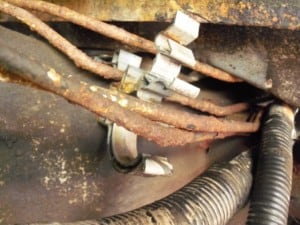NHTSA: Road Salt Can Cause Brake Failure
Brake Failure Linked to Road Salt
Last month, the National Highway Traffic Safety Administration (NHTSA) announced that road salt can lead to brake failure. While New Hampshire drivers have long been aware of this issue, it’s notable to see this warning coming from an official, non-New England source.

Tom Krisher and Tristin Hopper of the Canadian National Post explain the findings in their article,
“
Road Salt Can Lead to Vehicle Brake Failure, US Agency Warns
.”
For years, U.S. investigators were puzzled why the brakes on thousands of U.S.-made trucks and SUVs were failing without warning. Brake failures were behind at least 107 crashes and there were fears the problem could affect up to two million vehicles. The NHTSA probe, which began in 2011, looked at
GM trucks made in 1999-2003 after numerous reports indicated some of the U.S.’s largest passenger vehicles seemed unusually prone to sudden brake failure. Among the suspects: the
Cadillac Escalade, the Chevy Suburban, and the GMC Yukon.Investigators sent out surveys, reviewed safety records, and inspected 71 randomly selected vehicles, but found nothing warranting a recall. “A safety-related defect has not been identified at this time,” concluded the investigation, officially closed on Wednesday.
Instead, the probe concluded that sudden brake line ruptures could occur in any older truck or SUV in the U.S.’s “salt states.” “Salt and other chemicals can accumulate on road surfaces, can accumulate on your vehicle’s underbody, and could put you and your passengers in danger,” says a safety video issued by NHTSA.
The report identified eight years as the tipping point for corrosion leading to dangerous structural problems in vehicles driven in harsh conditions.
If your car is eight years old or older, you should inspect it twice a year, wash it frequently during winter (using a car wash with a good dryer to prevent freezing), and hope for the best. If your car is newer, consider trading it in before it reaches this critical age.
Preventive Measures: Rustproofing
Don’t just hope for the best—take action with rustproofing. Modern rustproofing protects brake lines, frames, sub-frames, and more. Today’s rustproofing professionals use advanced, scientifically formulated products that adapt to modern vehicle designs and road maintenance practices.
Unlike mild factory-applied rust inhibitors, professional rustproofing covers the entire vehicle undercarriage. This ensures protection for brake lines, wiring harnesses, and other critical components. In New Hampshire, The Rust Stop Pros offer expert rustproofing services.
NH Oil Undercoating® Workshop Series
Here is the first part of our 2017 workshop series. Part 1 covers:
- Introduction to NH Oil Undercoating® Oil-Based Rustproofing
- Surface preparation and inspection
- The science behind oil-based rustproofing (how it works)
- Equipment and maintenance
Watch Part 1 here:

 Buy US Direct
Buy US Direct Buy CA Direct
Buy CA Direct Buy EU Direct
Buy EU Direct Buy DE Direct
Buy DE Direct